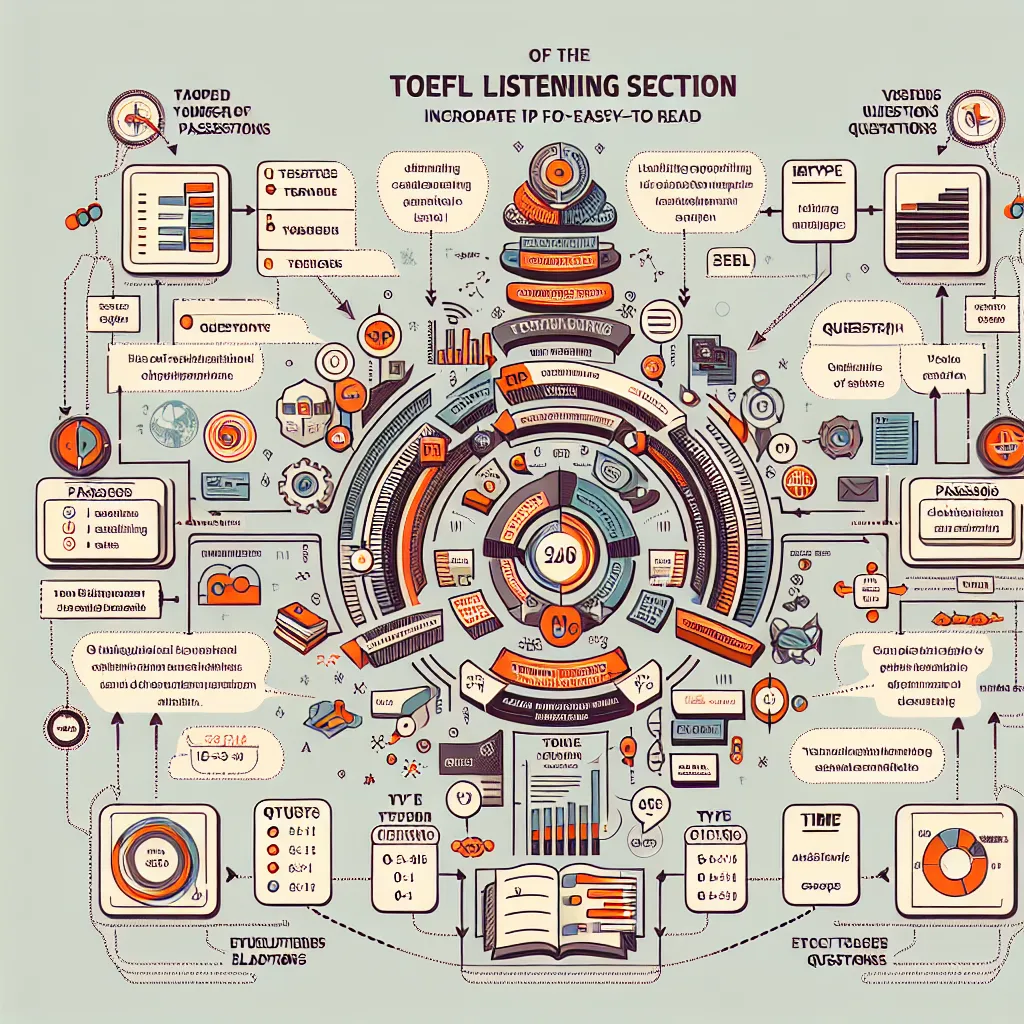Preparing for the TOEFL exam can be a challenging endeavor, particularly when it comes to the listening section. Many test-takers find this component particularly daunting due to its unique demands on comprehension and note-taking skills. In this comprehensive guide, we’ll explore the most effective strategies to practice and improve your TOEFL listening skills, ensuring you’re well-prepared for test day.
Understanding the TOEFL Listening Section
Before diving into practice methods, it’s crucial to understand what the TOEFL listening section entails. This part of the test assesses your ability to comprehend spoken English in academic settings. It typically includes:
- Conversations between students or between a student and a campus staff member
- Academic lectures on various subjects
The listening passages are followed by multiple-choice questions that test your understanding of main ideas, details, inferences, and speaker attitudes.
 TOEFL Listening Section Overview
TOEFL Listening Section Overview
Best Practices for TOEFL Listening Preparation
1. Immerse Yourself in English Audio
One of the most effective ways to improve your listening skills is through consistent exposure to English audio content. Here are some recommendations:
- Academic Podcasts: Listen to educational podcasts on diverse topics. Platforms like TED Talks and NPR offer a wealth of academic content.
- English News Broadcasts: Tune into news channels like BBC or CNN to familiarize yourself with different accents and speaking styles.
- Online Lectures: Websites like Coursera and edX offer free access to university lectures, which closely mimic the academic content in TOEFL listening passages.
2. Practice Active Listening
Passive listening isn’t enough. Engage actively with the content you’re hearing:
- Take notes while listening, focusing on main ideas and key details.
- After listening, try to summarize the content in your own words.
- Challenge yourself by listening to increasingly complex material as your skills improve.
3. Utilize Official TOEFL Practice Materials
The best way to familiarize yourself with the exact format and difficulty level of the TOEFL listening section is by using official practice materials:
- Official TOEFL iBT Tests: These provide authentic test questions and help you understand the exam structure.
- TOEFL Practice Online: This official tool simulates the real test environment, offering scored practice tests.
4. Develop Effective Note-Taking Strategies
Note-taking is crucial for the TOEFL listening section. Here are some tips:
- Use abbreviations and symbols to write quickly.
- Focus on main ideas and supporting details rather than trying to transcribe everything.
- Practice organizing your notes in a clear, logical manner.
5. Improve Your Vocabulary
A strong vocabulary will significantly aid your comprehension:
- Learn academic words commonly used in TOEFL passages.
- Study word roots, prefixes, and suffixes to help deduce the meaning of unfamiliar words.
- Create flashcards with new words and review them regularly.
6. Practice with Timed Exercises
Time management is crucial in the TOEFL test. Practice listening and answering questions within the allotted time:
- Set a timer when doing practice exercises.
- Gradually increase the speed at which you listen to audio content.
- Learn to pace yourself when answering questions.
 TOEFL Listening Practice Session
TOEFL Listening Practice Session
7. Analyze Your Mistakes
After each practice session:
- Review incorrect answers and understand why you made those mistakes.
- Identify patterns in your errors (e.g., difficulty with inference questions, misunderstanding of idiomatic expressions).
- Focus your future practice on areas where you consistently struggle.
8. Enhance Your Concentration Skills
The TOEFL listening section requires sustained concentration. Improve this skill by:
- Practicing meditation or mindfulness exercises.
- Eliminating distractions during your study sessions.
- Gradually increasing the duration of your listening practice sessions.
9. Familiarize Yourself with Different Accents
The TOEFL may include speakers with various English accents. Expose yourself to different accents by:
- Watching international English-language films and TV shows.
- Listening to podcasts featuring speakers from different English-speaking countries.
- Practicing with TOEFL materials that include diverse accents.
10. Join Study Groups or Find a Study Partner
Collaborative learning can be highly effective:
- Discuss and analyze listening passages with others.
- Practice explaining concepts you’ve heard, which reinforces your understanding.
- Get feedback on your note-taking and answering strategies.
Important Tips to Remember
- Stay Calm and Focused: During the actual test, remain calm and concentrate on the task at hand.
- Don’t Panic if You Miss Something: It’s normal to miss a word or phrase. Focus on understanding the overall context.
- Practice Regularly: Consistency is key. Set aside time each day for listening practice.
- Simulate Test Conditions: Occasionally practice in an environment that mimics the test setting to get accustomed to test-day conditions.
Next Steps
Now that you’re equipped with these strategies, it’s time to put them into action. Start by assessing your current listening skills with a practice test, then create a study plan incorporating these techniques. Remember, improvement comes with consistent practice and patience.
By following these best practices for TOEFL listening preparation, you’ll be well on your way to achieving your desired score. Stay motivated, track your progress, and don’t hesitate to adjust your study methods as needed. Good luck with your TOEFL preparation!
[internal_links]




